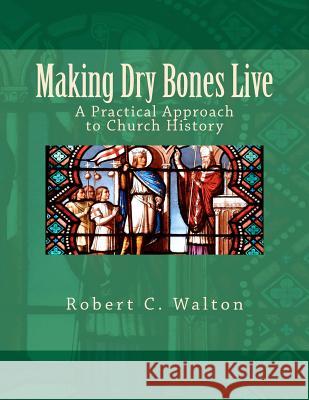Making Dry Bones Live: A Practical Approach to Church History » książka
Making Dry Bones Live: A Practical Approach to Church History
ISBN-13: 9780615539492 / Angielski / Miękka / 2011 / 540 str.
"The hand of the Lord was upon me, and he brought me out by the Spirit of the Lord and set me in the middle of a valley; it was full of bones. He led me back and forth among them, and I saw a great many bones on the floor of the valley, bones that were very dry. He asked me, 'Son of man, can these bones live?' I said, 'O Sovereign Lord, you alone know'" (Ezekiel 37:1-3). Many students approaching the study of Church History have felt a certain kinship with Ezekiel. They have looked around them and seen nothing but dead men's bones - and exceedingly dry ones at that. What good does it do to study the lives and writings of men who lived hundreds or even thousands of years ago? Those who study Church History with open eyes and open minds will find much that will make them better servants of Christ, both in their churches and in their communities. What are some of the things the reader should expect to gain from this study? First of all, Christians should expect to benefit from the examples of those who have gone before them. History is filled with fine Christian men and women whose examples should inspire us to follow in their footsteps. But we can also learn much by observing the failures and mistakes of others. Furthermore, Church History is able to teach us humility, as we observe the blind spots that plagued the greatest of God's servants. If men like Augustine, Luther, Calvin, and Whitefield had their flaws, both in their understanding of Scripture and in their ways of living, how much more must we, who lack their gifts and zeal, be on guard against those sins that make our own service to God less than perfect? Secondly, Christians should be able to gain a better understanding of how God works through the study of Church History. If Paul told the Corinthians that the incidents during the wilderness wanderings happened to the Israelites "as examples for us," the same is true of the more recent history of God's people. The same God is at work carrying out the same purposes, though admittedly we lack the inspired interpretation of more recent events that the Bible supplies for the Old Testament. Thirdly, the study of Church History gives life to Christian doctrine. Doctrine makes more sense if we realize how and why the church came to believe what it does. Furthermore, understanding of differences among the beliefs and practices of various churches will help us to be more tolerant of those differences, while at the same time developing the kind of discernment that will allow us to distinguish between truth and error, between legitimate differences and outright heresies. Furthermore, realizing how false teachings develop will enable us to be on guard against such teachings in our own lives, in our churches, and in the Christian world at large. Finally, the study of Church History helps the reader to develop a global perspective. We can serve Christ more effectively if we understand that the church goes far beyond the boundaries of our congregation, our denomination, and our country. A vision for the world comes only through a greater understanding of that world. The study of Church History not only serves the purpose of drawing Christians together as they see their common heritage, but it also motivates believers to care about and participate in the big picture - the Kingdom of God as it advances, around the world and throughout the centuries until Jesus comes. This text surveys the history of the Christian Church from the Apostolic Age through the end of the twentieth century. Unlike most history books, each chapter ends with a brief section seeking to apply the lessons of the chapter to the life of the reader in ways that will draw connections to the lives of Christians today.











